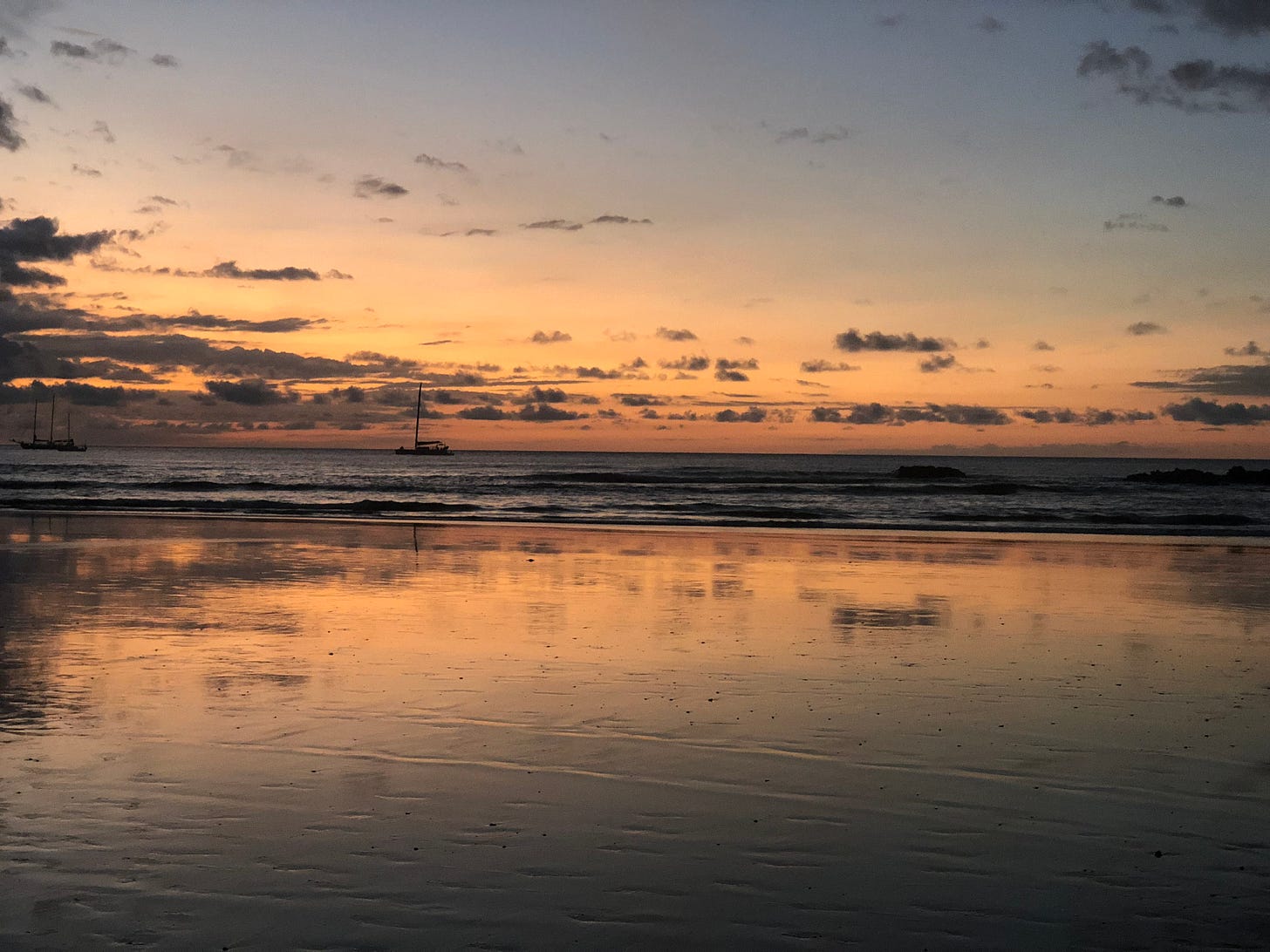Returning from a break in my palliative medicine training, I find myself on an eastbound flight over the Pacific. The western sunset behind us seems to go on forever, painting the clouds in pinks and yellows, the southern sky purpling and smudging into the water of the distant horizon. On the blue sea below, the orange of the sun glints off the tower of a westbound container ship that I can just make out. What a grand confluence of colors and nature and progress! Entire modern systems of transport and shipping and connectedness represented in a single moment.
Even as such awe-inspiring scenes play out before my eyes, I reflect that so much of my training this year has been focused not on the grand, but on the granular—the finite details and realities of each of my patients’ stories. It strikes me that I know nothing of the people on the ship down there.
I imagine now a young man on the ship, maybe the newest member of the crew, out on his own for the first time. Sea spray and setting sun in his face, calluses thickening on his hands as the days at sea stack up, milling about with the other deckhands—his first real experience of camaraderie outside the family, outside of his dusty hometown. I was he two decades ago, at age twenty-two, on the road, heading west for anywhere.
The orange of the sunset reflects back to him off our wings, and I wonder whether he imagines us from down there—two-hundred forty individuals from all over the world, this flying tube obscuring our granularity from his distant gaze. Two-hundred forty earth-bound individuals, temporarily defying our gravity, our souls at this moment halfway home to heaven, bodies forever tethered to dirt, destined for 6 feet under. Each of us with our unique thoughts, our peculiar smells, our particular aspirations, our personal memories.
The teenage girl next to me types a college admissions essay. I do my best to respect her privacy but cannot help noticing bits about her country of origin, her first-generation struggles, her mastery of coding and physics. Can the sailor below imagine any details like that about us up here? Surely, he cannot hear this toddler crying as his ears pop again! Does he wonder about our destination, the contents of our smartphone playlists, the turbulence we feel with each passing cloud?
I think back to an elderly patient I recently saw in the hospital, his body broken down, his mind drifting. Was he once a young man on the prow of a ship, sailing toward sunset with sea spray in his face, lapping up the joy of hard work and the fellowship of adventure, feeling the freedom and the bitterness of leaving home? What was his westward journey? Did he ever write a college essay? As a toddler, did he seesaw between innocent laughter and inconsolable tears? This patient of mine…did I actually listen to his stories, did I notice the far-off look in his eyes, did I appreciate the beauty of his distinct granularity?
I remember the words a terminal patient whispered to me earlier this year: ‘‘I am like all, I am like few, I am like none.’’ These words remind me to slow down and seek out the particularities of each of my patients, to relish our shared humanity. The granular keeps me grounded, keeps me whole, and leads to connections where I find that healing can happen in both directions.
The ocean below us soon grays. That young man on the prow of his ship, further west now, still has a bit of daylight to enjoy. He’ll soon be marveling at the sunset that I have already seen from way up here, before the darkness of night steadily envelops him, his mates, and his ocean. May clear skies afford him a bounty of stars.
An extra ration of grog for him tonight, Captain! He is free upon the earth, bound for glory with endless potential! Celebrate with him, so that in the decades to come he can look back on this time with the sweeping generalities of our imperfect memories: ‘‘at night we would come inside for warm food and rum and story and song.’’ I look forward to hearing his stories at the bedside many years from now. Back behind us to the west I see a clear demarcation between sea and sky, a stark line on the horizon that soon will fade, a setting sun for him to chase.
This reflection was recently published in The Journal of Palliative Medicine.* I am excited to share it with you now, Crash Cart Campfire!
*Jorgensen, T. "The Grand and the Granular." Journal of Palliative Medicine. Feb 2024; 27 (2): 273-274. doi: 10.1089/jpm.2023.0456.






This is lovely, Tyler. This may be one of my favorite things that you’ve written so far. “I am like all, I am like few, I am like none.“ I mean, seriously? What, are you taking care of Yoda?
What a lovely piece! Very thought provoking. Having this kind of perspective makes you the amazing human and physician that you are. It should be a mandatory read for all those in the healthcare profession.